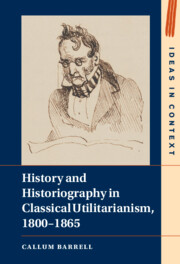Refine search
Actions for selected content:
7 results
5 - Systematic Possession
- from Part II - From Company Science to Public Science, 1813–1858
-
- Book:
- Monopolizing Knowledge
- Published online:
- 02 January 2025
- Print publication:
- 16 January 2025, pp 147-178
-
- Chapter
- Export citation
31 - Grist for the Mill: History and the Essay in India, 1870–1920
- from Part IV - Fractured Selves, Fragmented Worlds
-
-
- Book:
- The Cambridge History of the British Essay
- Published online:
- 31 October 2024
- Print publication:
- 04 July 2024, pp 469-482
-
- Chapter
- Export citation
9 - Mental Passivity: The British Tradition
- from Part I - Psychology’s Historical Foundations
-
- Book:
- History and Systems of Psychology
- Published online:
- 04 November 2022
- Print publication:
- 17 November 2022, pp 164-183
-
- Chapter
- Export citation
Chapter 10 - James Mill on Thomas Taylor’s Plato: Introduction
- from Part II - The past in the present
-
- Book:
- Explorations in Ancient and Modern Philosophy
- Published online:
- 24 March 2022
- Print publication:
- 31 March 2022, pp 264-271
-
- Chapter
- Export citation
Conclusion
-
- Book:
- History and Historiography in Classical Utilitarianism, 1800–1865
- Published online:
- 24 September 2021
- Print publication:
- 07 October 2021, pp 220-225
-
- Chapter
- Export citation
Introduction
-
- Book:
- History and Historiography in Classical Utilitarianism, 1800–1865
- Published online:
- 24 September 2021
- Print publication:
- 07 October 2021, pp 1-20
-
- Chapter
- Export citation

History and Historiography in Classical Utilitarianism, 1800–1865
-
- Published online:
- 24 September 2021
- Print publication:
- 07 October 2021
